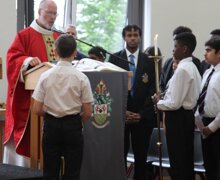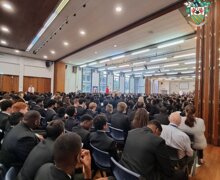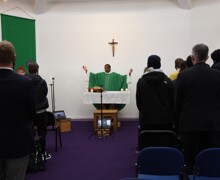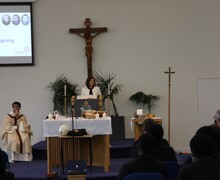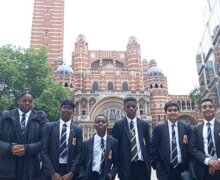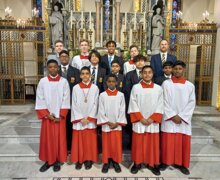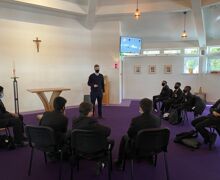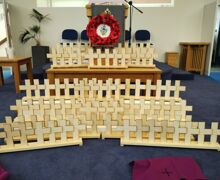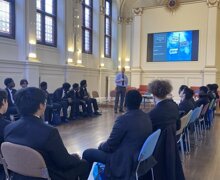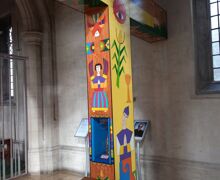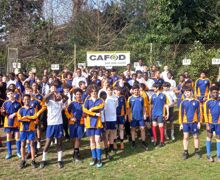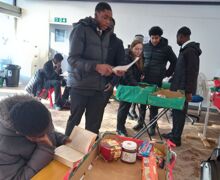- Home
- Catholic Life
- Chaplaincy
Chaplaincy
Jesuit schools are fortunate to be guided by a well-developed statement of the characteristic features which contribute to a recognizably Jesuit style of education:
The Characteristics of Jesuit Education, published in 1986, for worldwide use across all 2721 Jesuit schools, colleges and universities, sets out what a school needs to be and do if it is to be true to its Ignatian identity and fulfil its Jesuit mission. Our model of chaplaincy stems from this but has been specifically developed to meet the needs of students and staff at St Ignatius. There are eight key areas that we can identify:
1. Encounter with the person of Jesus Christ
2. Personal philosophy of life
3. Prayer
4. Worship
5. Social outreach
6. Leadership
7. Involvement in the life of the Church
8. Pastoral care
The College aims to assist each individual student in their spiritual development. The range of opportunities offered in the furtherance of this aim increases as students proceed through the school, as does the degree of choice.
“The spiritual quest is quite simply that of recognising the God who comes to meet us, and of having a free heart with which to respond to that meeting” - Archbishop Vincent Nichols
Social Outreach
The Chaplaincy and whole school are involved in a number of social outreach initiatives. The students join campaigns, raise awareness of and help to plan and run fundraisers throughout the year for local and international charities.
During Advent 2023 the student Faith in Action group chose two charities to support -
- Catholic Children's Society Crisis Fund (www.cathchild.org.uk/)
- North Enfield Foodbank (northenfield.foodbank.org.uk/)
To support the Catholic Children's Society the Faith in Action group held a bake sale, a Christmas accessory day and had a retiring collection during our Advent Carol Service.
To encourage students to donate to the Foodbank form classes were given an Advent Giving Calendar containing a list of urgently need items.
During the 2022-23 academic year each year group chose a charity to support:
Year 7: Jesuit Missions
Year 8: North London Hospice
Year 9: Nightingale Cancer Support Centre
Year 10: Jesuit Refugee Service UK
Year 11: Catholic Children's Society
Sixth Form: Cardinal Hume Centre and Women at the Well
We also have regular collections supporting Enfield Foodbank for which we have our own drop off point.
In November, Year 7 students joined in Jesuit Missions COP 27 - Walk. Pray. Change campaign. The challenge was to walk a mile, pray for their partners in South Sudan and for a positive outcome to the COP 27. The miles walked were added to the grand total with the target being 3,677 miles, the distance between Glasgow and Sharm el Sheikh.
During Advent we joined with Exodus Youthworx and other local schools and organisations in the Love Christmas campaign - providing Christmas Hampers for families in the local community.
Leadership
Students lead the daily Examen. Those who attend Wednesday prayer lead the Rosary and Stations of the Cross. During the liturgies throughout the year students take an active role in reading, serving and distributing Holy Communion as Eucharistic Ministers. Older students train and teach the younger members to Altar Serve. Students also lead assemblies.
Each year the College Captain and Vice Captains attend a Leadership Conference. The conference is run by the Jesuit Institute and is hosted by one of the Jesuit schools. This provides the students with the opportunity to develop their leadership skills through a variety of mediums including, debating, critical thinking and preparing and delivering presentations. It also gives them an opportunity to meet other Jesuit head boys and head girls, and to make new friends.
Our Fatih in Action group choses the charities we support, leads Acts of Worship to raiase awareness and fundraising.
In previous years, members of the Sixth Form have participated in the CAFOD Young Leadership programme which trains students to be CAFOD Ambassadors in school, leading assemblies and fundraising for their different campaigns.
Involvement in the life of the church
We have direct links with local parishes and the London Jesuit community, and priests from the local deanery and the Jesuit community reguarly visit the College. Every other year one of the monthly deanery meetings is held at the College.
Local and Jesuit priests offer the Sacrament of Reconciliation during Advent and Lent.
A number of students and staff have been trained as Eucharistic Ministers and many of the students are readers and servers at Mass.
Students have the opportunity to visit Westminster Cathedral and other religious sites of interest throughout the year.
Encounter with the person of Jesus Christ
The whole school day offers students and staff opportunities to encounter Jesus Christ. There are set times of prayer and reflection. Each piece of work that the students prepare is marked at the top with AMDG, Ad Maiorem Dei Gloriam, (for the greater glory of God).
The College also makes provision for the students to take time out from their busy schedules and to have a day of retreat/reflection with their individual form classes. During this time the students learn about mediation and personal prayer and are provided with the opportunity to experience Ignatian meditation in order to encounter Christ.
Personal philosophy of life
Jesuit education places an emphasis on, and assists in, developing the role of each individual pupil as a member of the human community. Students, teachers and all within the community are encouraged to build a unity with others that goes beyond race, culture and religion.
Jesuit education also stresses the importance of understanding the context in which teaching and learning takes place, and the need to constantly evaluate the power and value of what has been taught.
Students and staff are encouraged to continually find ways to develop and improve. The Magis (more) underpins all aspects of learning and development. This is the Jesuit philosophy linked to Ad Maiorem Dei Gloriam (for the greater glory of God), by doing more for God the rest of society benefits. The pursuit of academic excellence is appropriate in a Jesuit school, but only within the larger context of human excellence. The success of Jesuit education is measured not in terms of academic performance of students or professional competence of teachers, but rather in terms of human flourishing.
Across the world, Jesuit schools seek to form the spirit of their pupils through reflection and the art of discernment, as schools of prayer and faith. There is an attentive care and knowledge of our pupils as individuals ‘cura personalis’ (the whole person) which allows them to flourish and provides support and encouragement when life at home or at school is difficult.


